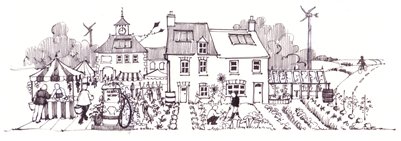

Whether you believe in Global Warming or not, one thing that I believe we can all get behind and support is independence on a local level.
Some towns in Europe and even the U.S. are creating local communities that support local food, business, energy, labor, supplies, and even local currency. These are known as Transition Towns. If you want to get a good overview of what this movement is, please read the description HERE, and view the following short video.
Michael Lusk from Sweden contacted me the other day. He is a member of a "core group of seven people who are working to establish transition culture locally." I asked him if he could tell me a little about this "transition culture" that he is working on, and he has this to say:
The transition idea began around five years ago in Ireland and England as a community-based response to peak oil and climate change. Its leading text is permaculture designer Rob Hopkins' book The Transition Handbook.
The transition movement is a large-scale self-organizing social experiment whose participants bring a great diversity of interrelated concerns revolving around local resilience. There are indications that restoring local food security is becoming the movement's primary short-term goal. Local monetary systems are also very important both as a practical measure promoting economic stability and as a means of restoring sovereign power to the people.
The transition movement is growing quickly and is already well established in the US: http://transitionus.ning.com/.
Here in Järna, Sweden, we've got a core group of seven people who are working to establish transition culture locally. We want to become as effective as the Totnes group, the original transition town in county Devon, England. One of our group's members, Peter Hagerrot, is visiting Rob's group in Totnes right now. He's arranged to give an interview on Swedish National Radio and contribute an article to Sweden's Nature when he returns.
Järna is the main centre of anthroposophy in Sweden, with many biodynamic farms, Waldorf schools and alternative medicine practitioners. Present and proposed regulation at transnational level is threatening all these activities that define our town's culture. Swedish national regulations implementing Codex Alimentarius are being used to threaten with closure our local clinic offering anthroposophical medical treatment. Swedish national regulations implementing EU-educational standards are being used to exclude important elements of the Waldorf curriculum. Experience in Europe – not to mention the Americas – makes it abundantly clear that proposed GMO "trials" will disastrously impact biodynamic farming.
Our initiative is the first transition initiative in Sweden – although we're linking with several organizations, which have been doing aspects of transition work here for many years and also Greenpeace Sweden, which is leading the fight against GMOs in our country. Our group met for the first time around two months ago. The initiative is still in the consciousness-raising stage. That's why we're on the lookout for public speakers right now. We don't have a page at transitionnetwork.org yet – for the moment you just have to mail us individually.
Lokalisera dig! = Localize Yourself!
Michael Lusk
So, whether the motivation behind these communities is to address climate change, peak oil, to be able to eat healthy, non-GMO food in the middle of a depression, or to just plain get away from big government and scale down to a local level, the foundation is good. We need to combat rampant globalization with localization. This means taking responsibility for changing our lives drastically for the good. The more localized we are, the more resilient we become when the bottom completely drops out of the economy. If we are not dependent on getting our food from another country, or even 1000 miles away, we will eat when the trucks stop running. If we look to the neighbor's kids to do the chores that we cannot do ourselves, and pay him/her with a form of local currency that can be cashed in for tomatoes at the local food stand, or for Sterling like the Totnes Pounds, we are sustainable. We become resilient. We will survive.








No comments:
Post a Comment